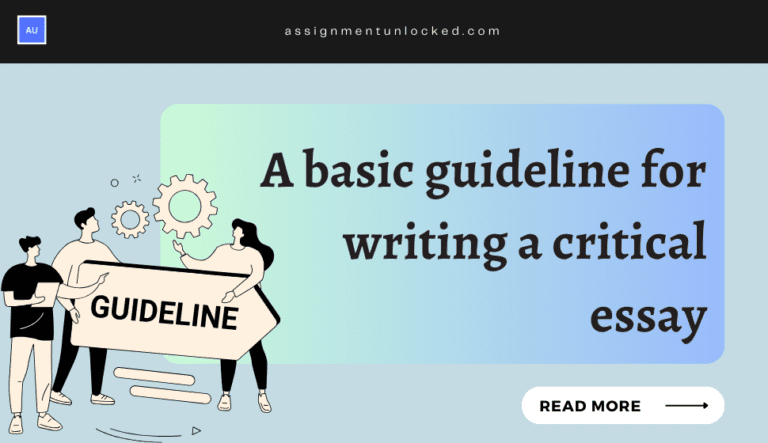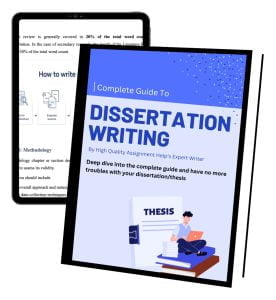Writing a critical essay can be an engaging and intellectually stimulating process. You can express your unique perspective and interpretation with essay writing help by critically analyzing a piece of literature, artwork, or any other subject matter. This guideline aims to provide you with the essential steps and insights necessary to craft a well-structured and thought-provoking critical essay.
Introduction
Writing a critical essay writing can be challenging, but with proper guidance, you can develop the necessary skills to excel in this form of academic writing. This article provides you with a basic guideline for writing a critical essay. Whether you are a student, a researcher, or an aspiring writer, understanding the key components, structuring, and writing techniques will help you craft a compelling critical essay that effectively analyzes and evaluates a piece of work.
Understanding Critical Essays
It’s crucial to have a firm understanding of what a critical essay involves before beginning to write one. In a critical essay, you examine a piece of art, such a book, movie, or artwork, and analyse its merits and flaws as well as how they affect the reader. This kind of essay demands a thorough understanding of the topic matter and the capacity to back up your claims with persuasive reasoning and facts.
- Definition of a Critical Essay
A critical essay is an academic writing that examines, interprets, and evaluates a literary work, artwork, film, or any other creative piece. It goes beyond summarizing the content and analyses the author’s arguments, themes, techniques, and overall effectiveness. A critical essay aims to provide an informed critique, offering positive and negative aspects while presenting a well-reasoned evaluation.
- Purpose of Writing a Critical Essay
The purpose of writing a critical essay varies depending on the context. It can demonstrate your understanding and interpretation of a text, engage in a scholarly debate, or contribute to existing knowledge. By critically analyzing a piece of work, you develop skills in evaluating evidence, constructing arguments, and presenting your ideas effectively.
Key Components of a Critical Essay
To write an effective critical essay, it is essential to understand the key components that make up this form of writing.
- Thesis Statement
Every critical essay should have a clear and concise thesis statement that presents your main argument or evaluation. This statement sets the direction for your paper and guides the reader on what to expect.
- Evidence and Analysis
Supporting your thesis statement with relevant evidence and analysis is crucial in a critical essay. Carefully examine the text or work you are critiquing and provide examples, quotations, or references to substantiate your claims. Analyze the evidence to demonstrate how it supports your argument or evaluation.
- Counterarguments and Rebuttals
Addressing counterarguments strengthens your critical essay and shows your ability to consider alternative perspectives. Anticipate potential objections or differing opinions and provide counterarguments to refute them. Rebut the counterarguments by presenting evidence or reasoning that supports your initial evaluation.
- Conclusion and Final Thoughts
Conclude your critical essay by summarizing your main points and restating your thesis statement. Provide final thoughts on the significance of the work being analyzed and its broader implications. Avoid introducing new information in conclusion and ensure it leaves a lasting impression on the reader.
Structuring a Critical Essay
Structuring your critical essay logically and coherently enhances its readability and organization. Follow these key sections to ensure a well-structured essay:
- Introduction
The introduction introduces the work you will be analysing and sets the scene for your critical essay. To grab the reader’s interest and give relevant background information, begin with an intriguing first line. Your thesis statement should be used to close the introduction.
- Body Paragraphs
The body paragraphs form the core of your critical essay. Each section should focus on a specific aspect or argument related to your thesis statement. Present your evidence, provide analysis, and connect to your main idea. Use topic sentences to guide the reader through each paragraph.
- Conclusion
Your critical essay’s conclusion should restate your thesis statement and a summary of the major issues raised in the body paragraphs. Give the reader a last set of insights and a provocative final statement.
Writing Tips and Techniques
To enhance the quality and effectiveness of your critical essay, consider the following tips and techniques:
- Research and Preparation
Before starting your critical essay:
- Conduct thorough research on the subject matter.
- Familiarize yourself with the author’s background, historical context, and relevant literary theories.
- Take detailed notes to organize your thoughts and support your analysis.
- Clear and Coherent Writing
Write your critical essay clearly and coherently. Use precise language, logical transitions, and well-structured paragraphs to guide the reader through your arguments. Ensure your writing flows smoothly, making it easy for the reader to follow your analysis.
- Critical Thinking and Analysis
Engage in critical thinking and analysis throughout your essay. Evaluate the strengths and weaknesses of the analyzed work, question the author’s intentions, and explore alternative interpretations. Develop your arguments based on well-founded reasoning and evidence.
Proofreading and Editing
Proofreading and editing are essential steps in the writing process. After completing your critical essay:
- Take the time to review and revise it.
- Check for grammar and spelling errors, ensure proper formatting, and refine your arguments for clarity and coherence.
- Consider seeking feedback from peers or instructors to gain valuable insights.
Conclusion
Writing a critical essay requires careful analysis, evaluation, and presentation of your ideas. Following this article’s guidelines, you can develop the necessary skills to craft a compelling critical essay. Remember to establish a clear thesis statement, support your arguments with evidence and analysis, address counterarguments, and present a thoughtful conclusion. With essay writing services, you can become proficient in writing critical essays that contribute to intellectual discourse and academic excellence by considering Assignment Unlocked, we provide highly qualified professionals so that student can receive guidance on how to structure their essays we are one of the best essay writing help provider.






